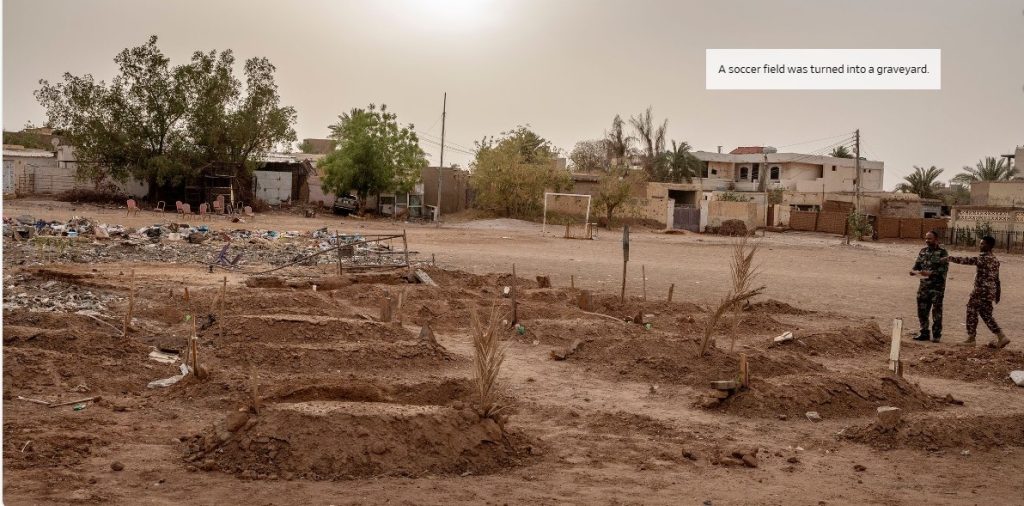Phyllis Chestler comments on this article from the Wall Street Journal
Where are campus protests against this real genocide and famine. ? Why don’t Black Lives Matter when the Blacks are the mass murderers? What a double standard.
OMDURMAN, Sudan—The smell of death still hangs over a historic intersection of this once-majestic capital on the Nile.
The Mahdi, the charismatic cleric who defeated Egyptian and British armies to build a short-lived Sudanese state in the 19th century, is buried in a silver-domed mausoleum nearby. Down the street stands a colonial clock tower, whose chimes for decades helped residents track the passage of time.
Now, Kalashnikov-toting soldiers, some dressed in T-shirts and flip flops, patrol between burned out vehicles, as the sound of gunfire cuts through the air. The men point to mattresses and blankets used to mark the graves of their slain opponents, carefully stepping over bits of clothing stained with decaying flesh. Metal casings from thousands of bullets and other munitions litter the ground.
“370-something,” said one officer when asked about the number of corpses his comrades recovered from this crossroads, which just weeks before had been the site of a key battle in the 16-month-old war that has ripped apart Africa’s third-largest nation.
Not since the battle for Damascus, more than a decade ago in the Syrian Civil War, has a national capital city been the sustained front line in a major war. The fighting has destroyed large parts of what was once one of Africa’s most populous cities, home to an estimated nine million people and the ministries, banks and corporations that powered Sudan’s political life and economy.
Sudan is now experiencing the biggest humanitarian crisis on the planet, including in the western region of Darfur, where new atrocities have prompted warnings of another genocide and international experts earlier this month confirmed the world’s first famine since 2017. More than half of the country’s 48 million people are suffering from hunger, while one out of four have been forced from their home. By some estimates, as many as 150,000 Sudanese have been killed. ..
Like the capital, the rest of the country is now divided between the military and its former ally, the RSF, which grew from the notorious Janjaweed fighters that Sudan’s longtime dictator, Omar al-Bashir, employed to terrorize Darfur in the early 2000s. The two armies are led by rival generals fighting for control over Sudan’s vast gold reserves, the life-sustaining waters of the Nile River and the country’s strategic perch on Red Sea shipping lanes.
One recent study projected that famine in Sudan could kill as many as 2.5 million people, about 5% of the population, by the end of September. Even half of those deaths would constitute the deadliest hunger crisis since the Ethiopian famine of the 1980s.
Sudan’s postcolonial history has been marked by back-to-back and parallel conflicts, including the two-decade war that led to the partition from South Sudan in 2011 and the slaughter of Black farming communities in Darfur in the early 2000s, in what the U.S. considers the first genocide of the 21st century.
But the capital had largely been spared from the violence. Even when Sudan was under U.S. sanctions for allegedly sponsoring terrorist-designated groups such as al Qaeda and Hamas during Bashir’s rule, Khartoum thrived with 5-star hotels, upscale restaurants and a vibrant underground art scene. It was young professionals from the capital who, in the spring of 2019, seized on a series of cost-of-living protests to build a larger revolutionary movement, eventually prompting the military and the RSF to end Bashir’s iron-fisted 30-year-rule in a coup.
The military’s takeover of much of Omdurman this spring laid open the horrors perpetrated by the RSF and the destruction wrought by the battles for the city.
Shockwaves from explosions have blown out the windows of one of the city’s main Coptic churches. A neighborhood soccer field is now an improvised graveyard. Between apartment blocks, high schools and youth clubs pockmarked by bullets and shrapnel, heaps of rubble hold souvenirs of everyday life: a mangled trumpet, a child’s beige rubber Croc, the torn pages of a calendar, a woman’s gold-embroidered scarf wrapped around a lamppost.

Much of the military leadership, including Burhan, has decamped from Khartoum to the Red Sea city of Port Sudan, one of the country’s few remaining safe havens. Even there, the collapse of the economy and agricultural production across Sudan has left many suffering hunger. Last month, the country’s statistics agency said annual inflation hit 138% in the first six months of the year. On the black market, one U.S. dollar now buys around 2,700 Sudanese pounds, meaning that even small purchases have to be made with thick wads of cash.
Holding her coughing 2-year-old son, Ali, in her arms in a malnutrition ward in Port Sudan, Fatima Mahamed Tahir, 25, said most of her family’s meals now consist of plain rice and porridge mixed with water. Doctors at the facility said a lack of nutrients had left Ali anemic and unable to fight a worsening chest infection. Nearby, two emaciated sisters were sharing a bed, the older one fanning the little one, who was fighting to breathe under an oxygen mask, with a piece of cardboard.
This is just edited paragraphs from a long and important article. It is worth reading in its entireity. Link here.
- Like
- Digg
- Tumblr
- VKontakte
- Buffer
- Love This
- Odnoklassniki
- Meneame
- Blogger
- Amazon
- Yahoo Mail
- Gmail
- AOL
- Newsvine
- HackerNews
- Evernote
- MySpace
- Mail.ru
- Viadeo
- Line
- Comments
- SMS
- Viber
- Telegram
- Subscribe
- Skype
- Facebook Messenger
- Kakao
- LiveJournal
- Yammer
- Edgar
- Fintel
- Mix
- Instapaper
- Copy Link






